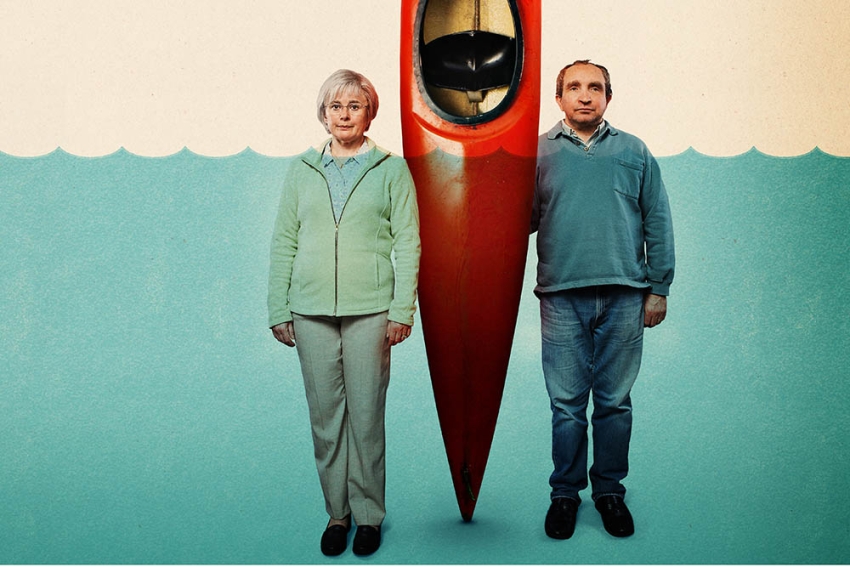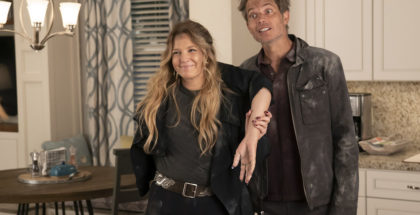Amazon Prime TV review: The Walking Dead Season 4
Review Overview
Pacing
7Pathos
8Performances
9David Farnor | On 12, Oct 2014
We look back at Season 4 of The Walking Dead – and how you can catch up with AMC’s zombie series.
“No one mentioned how boring the end of the world was going to be.”
That’s Lilly, daughter to a wheelchair-bound father, trying to stay alive in The walking Dead Season 4. It’s a throwaway gag that cuts right to the heart of AMC’s zombie series, which has never been afraid of dragging its feet: in The Walking Dead, the world doesn’t end with a bang, but with a long, drawn-out whimper, which can last for days, months or years.
The show’s behind-the-scenes struggle to shuffle forwards has been just as fraught: Scott M. Gimple now takes the showrunner reins following the departure of yet another head writer, Glen Mazzara, at the end of Season 3. As a result, it’s perhaps wishful thinking that this 16-episode run feels more haphazard than most.
Last season ended with a surprisingly abrupt conclusion, which saw Rick and our band of survivors hole up in the prison after fighting off the Governor – only to leave him alive, his threat unresolved. It was not the truncated nature of the story that caught you off guard, though, so much as the air of hope that surrounded it. This, you felt, could be the start of a rebuilt civilisation.
But people don’t do society very well. And The Walking Dead knows it. So that feeling doesn’t last for long: if Season 3 cut off too soon, Season 4 exploits the false happy ending by watching it slide slowly, inevitably, into despair.
Within a matter of episodes, illness appears to be spreading through the jail, turning people safe behind bars into walkers without the need for a bite or bullet. It forces our small group to go back to the meat and potatoes of the series: tough moral decisions. No matter what happens, the show never loses sight of its central dilemma: at what point do you stop trying to help others and start killing to save yourself?
It’s testament to the quality of the cast that watching them go through the arduous decision-making process still packs such a punch. Melissa McBride’s Carol, in particular, has grown from a background player to one of the show’s biggest assets, switching from tough-but-kind mother for the new kids on the block to a woman prepared to kill for the greater good without flinching. Seeing her up against Andrew Lincoln’s Rick, trying to redeem himself after going full dictator in Season 3, their blunt exchanges ripple with tension.
It’s old man Hershel, though, who proves the group’s strongest member: all frail sighs and slow talking, Scott Wilson’s veteran has become the moral compass of the show. He frequently delivers the Important Speeches in Season 4 – and nails them every time.
“You step outside, you risk your life,” he says in Episode 3. “You breathe, you risk your life. You don’t have a choice any more. The only choice you can make is what you risk it for.”
If the first half of Season 4 sees that lack of choice drive the group apart, the second half somewhat clumsily tries to bring them all back together for the climax.
The turning point is bookmarked by the return of everyone’s favourite one-eyed villain, The Governor. It’s telling that he doesn’t appear until Episode 6, a gap that underscores both the season’s weakness at pacing and strength at character-building.
His re-introduction reboots his back-story, starting with the massacre of his former town. Abandoned in the middle of nowhere, he fends for himself, before falling in with Lilly and her sister and dad. Bearded, quiet and mourning for his daughter, he goes from a figure of fear to one of tragedy. David Morrissey is skilled enough to pull off both extremes with believable intensity; you actually feel sorry for the guy, something that seemed impossible 10 hours ago.
While we follow his rehabilitation back into civilisation, though, the nature of his tragedy becomes clearer: it’s not that he’s lost everything, but that he’s unable to change his ways, destined to continue losing everything. Conflict arises once more, Hershel forever preaching peace and the Governor eternally waging war. It should feel repetitive, but Gimple’s guiding hand on the story cards makes sure the stakes have changed.
The same is true of our individual plot strands; the return-to-roots set-up splits our heroes up, echoing Season 1 all over again, but gives us some much-needed quality time with familiar, and new, faces. Glenn chases after lost love Maggie, helped by Tara, Lilly’s sister, who grows into a welcome member of the team. Michonne, who is shacked up with Rick and son Carl, actually smiles for the first time – a development that shows Danai Gurira’s softer side, backed up by revealing flashbacks to her pre-walker lifestyle. At the same time, we meet someone who might be able to cure the whole outbreak, a useful thread looking ahead.
But if the speed and focus becomes especially uneven here, the writers tease out enough of these insightful moments to keep you hooked. Lizzie and Mika test Carol’s (and Tyreese’s) motherly resolve, as we see the shocking effect of the plague on young children for the first time. Chandler Riggs as Rick’s son, Carl, continues to grow into his dad’s shoes; he still wears the silly Sheriff hat, but has acquired the callous edge to go with it. His transformation keeps Andrew Lincoln’s journey fresh too, one of them reaching for the star badge, the other backing away from it. Carl not only helps to justify Rick’s monstrous acts of violence but also gives him a chance of redemption; one stand-out scene sees him reach for Carl’s feet in a darkly lit room, groaning in pain, almost indistinguishable from a walker.
Norman Reedus’ Daryl, meanwhile, finally gets the extended screen-time he deserves: hiding with Hershel’s daughter, Beth, in a funeral parlour, the downbeat Reedus and desperately naive Emily Kinney spark against each other beautifully, creating some tender, sad and funny conversations – one game of Never Have I Ever, accompanied by a bottle of moonshine, is a delightful change of tone.
That lurch in atmosphere and pace continues to irritate, but it’s also what makes The Walking Dead such a thrilling programme; it moves in fits and bursts of fear and feelings, which means it is always capable of surprising, even when you think you’re somewhere you’ve already been before.
Flashforwards as well as flashbacks join the fray for the first notable time, foreshadowing death as well as recalling human life. But if the opening feels like the most haphazard season to date, the ending is the most audacious: a cliffhanger that pushes the remaining survivors right to the edge and reminds us that whoever does so is screwing with the wrong people.
“No one mentioned how boring the end of the world was going to be,” says Lilly to the Governor. The Walking Dead revels in the boring details of the end of the world, but when even the most dull act risks someone’s life, the suspense of the mundane makes this horror series one of the scariest on TV.
The Walking Dead Seasons 1 to 4 is available to watch online on Amazon Prime Instant Video, as part of a £5.99 monthly subscription – or, if you want free next-day delivery too, as part of a £79 annual Amazon Prime membership.
Where can I buy or rent The Walking Dead Season 4 online in the UK?
For more information, see where can I watch The Walking Dead online?.
Photo: Gene Page/AMC
























